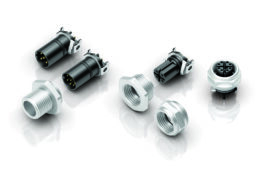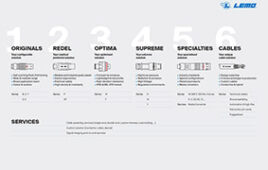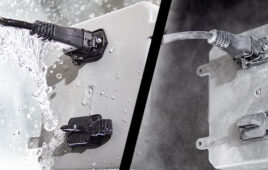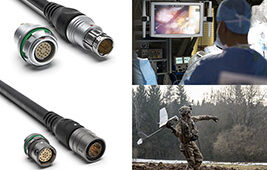Washdowns. Caustic elements. High moisture content. Companies operating equipment or machinery in these environments need to pay special attention to the harmful effects on electrical connections. To insure connection integrity and guard against premature failure, choose cord connectors made from specific materials and seek out connector manufacturers that can support a variety of materials in both standard and custom configurations.
Cord connectors (also known as cable grips & cable glands) provide the means for passing cord or cable into an enclosure, through a bulkhead or into a control panel. They prevent cable pull-out and premature fatigue because they secure the cable where it enters the enclosure, or where it terminates into a hardwired application.

Cord connectors let you pass cord or cables
through structures, and prevent cable pull-out and premature fatigue
because they secure the cable where it enters the structure.
They can be made from several different materials including aluminum, steel, and nylon. But for harsh environments those materials do not offer the needed corrosion resistance. Materials best suited for use in harsh environments include stainless steel, Valox®, and nickel-plated aluminum. The benefits of these three materials include:
Stainless Steel offers:
• exceptional tensile strength for the highest levels of durability in severely corrosive environments filled with acids, chemicals or chlorine-bearing agents
• durability, with excellent fatigue and impact resistance
• operating temperatures of -60°F to +1000°F, where it retains its strength
• resistance to rust and most other forms of corrosion
• cleanable and hygienic because of its smooth and minimally porous surface
Valox:
• offers superior corrosion-resistance and is suitable for use in FDA mandated washdown environments
• is non-hydroscopic so it won’t absorb moisture
• offers health-care grades that meet FDA specifications for food contact
• is resistance to chemicals and high-heat
• operates in temperatures of -40°F to +284°F
• is impact-resistant
Nickel-Plated Aluminum:
• is non-toxic, making it suitable for all types of food handling equipment requiring corrosion and wear-resistance
• prevents rust from moisture and high humidity
• resists corrosion by many alkalis and weak acids
• operates to temperatures of -40°F to +500°F
• is a lightweight, low-cost alternative to stainless steel

Materials best suited for cord connectors used in harsh environments include stainless steel and nickel-plated aluminum.
These materials typically have an IP rating defined by the International Standard IEC that classifies the level of protection that enclosures of electrical equipment have against intrusions of foreign bodies and water. Four IP ratings are crucial to connectors operation in harsh environments including:
• IP 65 — totally protected against dust (dust-tight) and low-pressure jets of water from any direction
• IP 66 — totally protected against dust (dust-tight) and against high-pressure (powerful) jets of water from any direction
• IP 67 — totally protected against dust (dust-tight) and against the effects of temporary immersion in water between 15 cm and 1 m
• IP 68 — totally protected against dust (dust-tight) and long periods of immersion in water under pressure, or complete and continuous immersion in water (water-tight) DW
Remke Industries, Inc.
www.remke.com
:: Design World ::
Filed Under: Connectors (electrical) • crimp technologies





Tell Us What You Think!